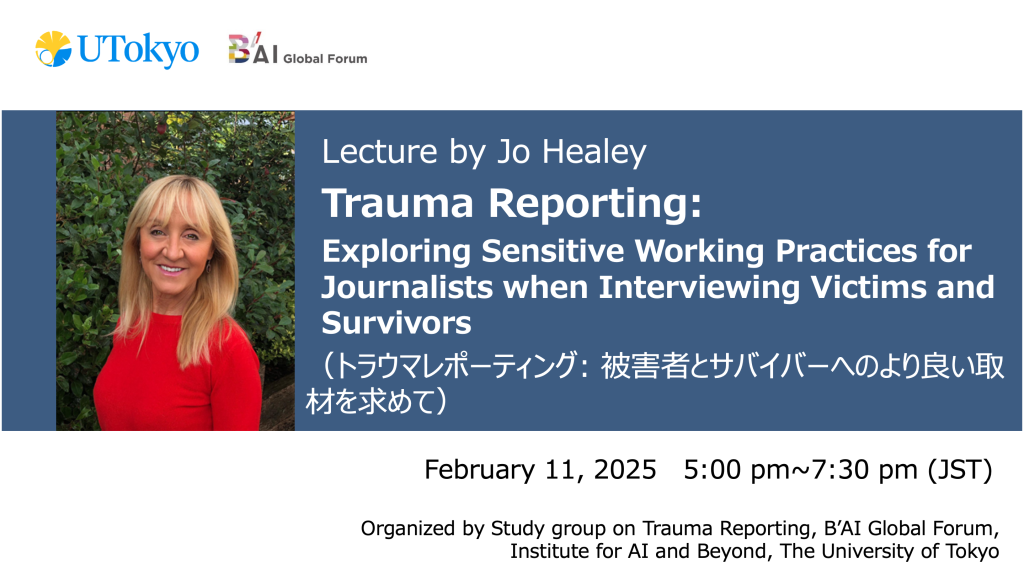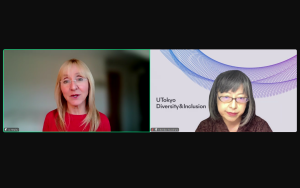2025.Mar.14
REPORTSReport on Lecture by Jo Healey
“Trauma Reporting: Exploring Sensitive Working Practices for Journalists when Interviewing Victims and Survivors”
Michiko Kawahara (Project Professor, Interfaculty Initiative in Information Studies, The University of Tokyo)
English Translation: Sunjin Oh (Project Assistant Professor, B’AI Global Forum)
•Date: Tuesday, February 11, 2025, 5:00~7:30 pm (JST)
•Venue: Online (Zoom Webinar)
•Language: English & Japanese (consecutive interpretation available)
•Speaker: Jo Healey (Journalist)
•Moderator: Michiko Kawahara (Project Professor, Interfaculty Initiative in Information Studies, The University of Tokyo)
(Click here for details of the event)

On 11 February 2025, the study group on Trauma Reporting at the B’AI Global Forum held an online lecture by British journalist Jo Healey, author of Trauma Reporting: A Journalist’s Guide to Covering Sensitive Stories. (No later viewing available.)
To help journalists recognize trauma in their interviewees and respond more appropriately, Healey developed training programs for reporters while working at the BBC. This was later published as Trauma Reporting. The book is structured around the insights of victims, disaster survivors, eyewitnesses, bereaved families, and survivors of sexual violence who have given interviews, incorporating expert opinions and the experiences of veteran journalists. Her advice is highly concrete and practical.
Currently working independently, Healey collaborates with international organizations and human rights activists, conducting lectures and training for journalists and university students in various countries. https://www.traumareporting.com/
In Japan, journalist training is often divided into categories such as but the availability of training varies significantly between organizations. While a broad understanding of the concept of trauma (deep psychological wounds) would allow for flexible application, training from this perspective remains scarce, leaving journalists with deep uncertainties in their work.
The act of listening to individuals in distress while ensuring they are treated with appropriate care and bringing their issues to public attention is a practice shared by journalists, researchers, and human rights activists. With this in mind, we asked Healey to give a basic lecture that would help those in listening roles move closer to the principle she upholds: “Do your job, do it well, do no harm.”
◾️ Do Your Job, Do It Well, Do No Harm.
Healey has interviewed numerous “ordinary people to whom something extraordinarily bad or difficult happens.” She began Trauma Reporting training about ten years ago.
Why is the training necessary in the first place? At the beginning of the lecture, moderator Kawahara introduced a quote from Healey’s book:
“ It struck me that our traditional approach of …… sending reporters routinely to knock on the doors of the newly and tragically bereaved, without any formal training …… is at best outdated and at worst risky and potentially harmful.”
In her lecture, Healey stated,
“Listening to sensitive stories carries risks. It is not right to approach interviewees without preparation.”
“It is crucial to fully grasp the messages conveyed by those who have shared their traumatic experiences in interviews and to minimize harm as much as possible.”
She played audio recordings of approximately ten individuals—including bereaved families of murder victims and survivors of sexual violence—who shared their experiences with journalism. She provided concrete explanations of which journalistic actions contribute to “compassion” and “respect” and which do not.
◾️ What Kind of Approach Leads to Empowerment?
For example, she emphasized the importance of “small choices” and “a sense of control.”
Experiencing trauma often involves having one’s will ignored or one’s control taken away. Therefore, instead of simply directing interviewees—“Go there, do this”—it is better to involve them in decision-making wherever possible. This makes the process smoother and more respectful. It is safer to continuously check whether the person is comfortable answering, and if they become emotional, rather than abruptly stopping the conversation, it is better to ask, “Would you like to take a break? Would you like to continue?”
Since recalling traumatic memories can be distressing, it is also advisable to engage in grounding conversations at the end of an interview to help interviewees return to the present moment.
She also introduced findings from an international survey asking disaster survivors what positive elements they found in their interactions with journalists. The top response was “honesty,” followed by six other key factors such as “being in control,” which Healey explained in detail.
At the same time, she emphasized that journalists must also be aware of their professional boundaries.
◾️ Journalists Are Also Affected
For journalists, hearing and witnessing traumatic experiences can be an earth-shattering event. Feelings of helplessness, guilt, fear, insomnia, and irritability are common symptoms. Healey stressed the importance of recognizing these signs in colleagues and fostering an environment where journalists can support each other.
During the Q&A session, participants raised various concerns, including:
- “After covering a trauma-related story, I want to share the experience with my team, but some people just want to leave quickly. What should we do if there’s limited time for discussion?”
- “Some interview situations are extremely difficult, and when I consulted a specialist, they pointed out that I was already showing signs of exhaustion. How can I take care of myself amidst the daily workload?”
- “Young journalists who want to improve their trauma reporting skills sometimes face criticism from senior reporters who claim these methods compromise journalistic neutrality. How should we navigate this?”
Healey provided detailed responses to each question.
Later, she remarked that these concerns were not unique to Japan—similar questions are frequently raised in her training sessions around the world.
Attendees shared a range of reflections, with a general consensus that the session offered valuable learning opportunities, including:
- “Hearing the voices of multiple interviewees helped me deeply understand their perspectives.”
- “I wish I had known this when I was younger.”
- “I will take to heart the six key factors that contribute to empowerment.”
- “Learning how to give interviewees a sense of control was especially valuable.”
- “I was already aware of the importance of word choice, but hearing survivors’ voices helped me understand why certain ways of asking questions can be harmful while others are more constructive.”
- “This is also relevant for conducting research interviews.”
- “These insights can be applied to interviews conducted to support people in distress and connect them with public resources.”
